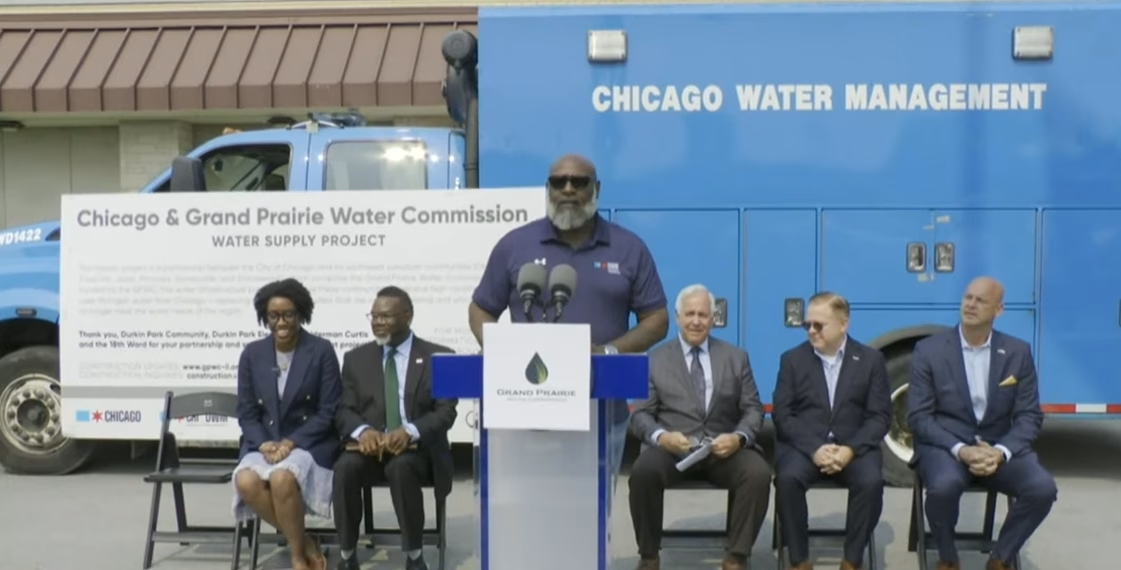The Grand Prairie Water Commission has officially commenced construction on a transformative infrastructure project designed to deliver treated Lake Michigan water to six southwest suburban communities in Illinois. This $1.5 billion initiative aims to ensure a sustainable and reliable water supply for over 250,000 residents in Joliet, Crest Hill, Channahon, Minooka, Romeoville, and Shorewood.
Addressing Future Water Needs
Current studies indicate that the deep aquifers supplying these communities are projected to become insufficient by 2030. In response, the Grand Prairie Water Commission was established in June 2024 under the Illinois Regional Water Commissions Act. Furthermore, this independent entity, governed by a board with equal representation from each member municipality, is tasked with overseeing the design, construction, and maintenance of the new water transmission system.
Also Read Bally’s Resume Construction on its $1.7 Billion Chicago casino
Comprehensive Infrastructure Development
The project’s scope includes constructing a 4-million-gallon storage facility and two 55-million-gallon-per-day pumping stations in Chicago. Additionally, over 60 miles of transmission mains, three pumping stations, and three water storage tanks will be built to facilitate water delivery to the member communities. Construction is expected to continue through 2029, with water service anticipated to begin in 2030.
Also Read Spain Earmarks Funds for Morocco-Spain Underwater Tunnel Study
Economic Impact and Community Considerations
Furthermore, under a 100-year agreement, Chicago will supply treated water to the commission, making it the city’s second-largest water customer. This deal is projected to generate approximately $30 million annually for Chicago’s Department of Water Management . While the project promises long-term benefits, leaders acknowledge that water bills in member communities may rise. In addition, efforts are being made to manage these increases responsibly, aiming to keep them within reasonable limits.
A Collaborative Effort for Sustainable Water Supply
The groundbreaking ceremony, held at Chicago’s Southwest Pumping Station, was attended by local and federal officials, including Congresswoman Lauren Underwood and Chicago Mayor Brandon Johnson. Furthermore, their presence underscores the collaborative effort and cross-jurisdictional coordination that have been pivotal in bringing this project to fruition. Further, once operational, the system will provide a joint waterworks solution using Lake Michigan as a sustainable source to meet the present and future needs of all six communities.
Also Read The Foglia Residences: Affordable Housing for the Blind and Veterans in Chicago
Project Overview
Project Name: Grand Prairie Water Commission (GPWC) Alternative Water Source Program, Lake Michigan
Purpose: To provide a sustainable and reliable drinking water supply by delivering treated Lake Michigan water to six southwest suburban communities in Illinois: Joliet, Crest Hill, Channahon, Minooka, Romeoville, and Shorewood.
Background: The existing deep aquifers supplying these communities are projected to become insufficient by 2030, necessitating an alternative water source.
Commission Formation: Established in June 2024 under the Illinois Regional Water Commissions Act, the GPWC is an independent legal entity governed by a Board of Commissioners with equal representation from each member community.
Project Components:
Construction of over 60 miles of transmission mains to convey water from Chicago to the member communities.
Development of a 4-million-gallon storage facility and two 55-million-gallon-per-day pumping stations in Chicago.
Installation of three additional pumping stations and three water storage tanks along the transmission route.
Timeline:
Engineering and design phases began in 2021.
Construction commenced in 2025 and is expected to continue through 2029.
In addition, system testing and startup are scheduled for early 2030, with full water service anticipated by May 2030.
Budget and Funding:
Total project cost is estimated at approximately $1.5 billion.
Funding sources include low-interest state and federal loans, grants, and revenue bonds.
Additionally, the project has secured a $373 million loan through the Water Infrastructure Finance and Innovation Act (WIFIA) program.
Economic Impact:
Under a 100-year agreement, Chicago will supply treated water to the GPWC, generating an estimated $30 million annually for the city’s Department of Water Management.
Community Impact:
The project aims to ensure long-term water reliability for over 250,000 residents, with the capacity to serve up to 388,000 people as the region grows.
While water bills in member communities may increase, efforts are being made to manage and mitigate these costs effectively.

Leave a Reply